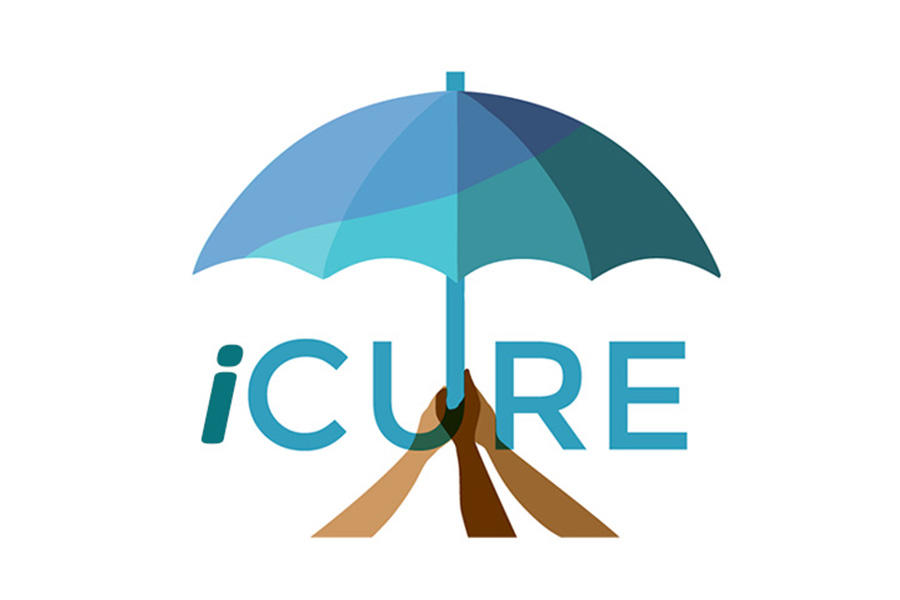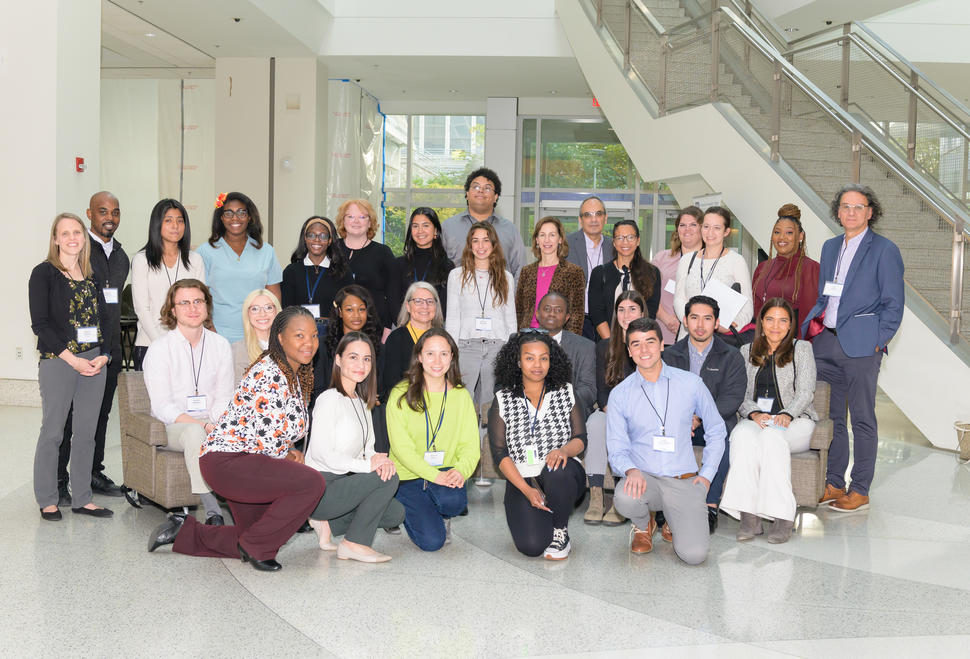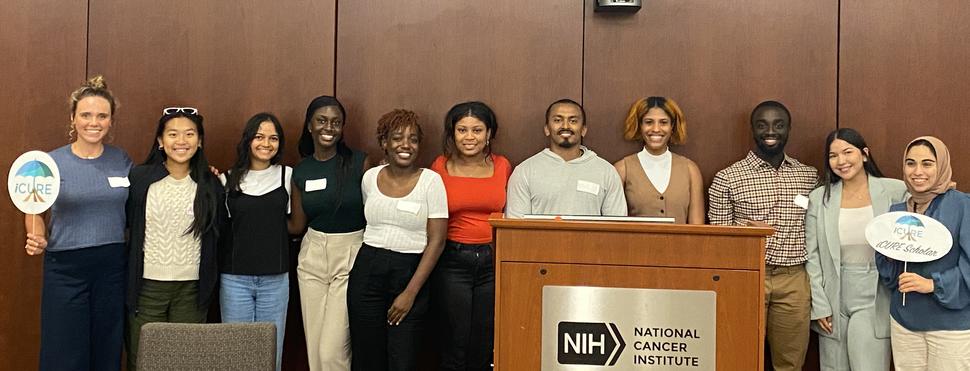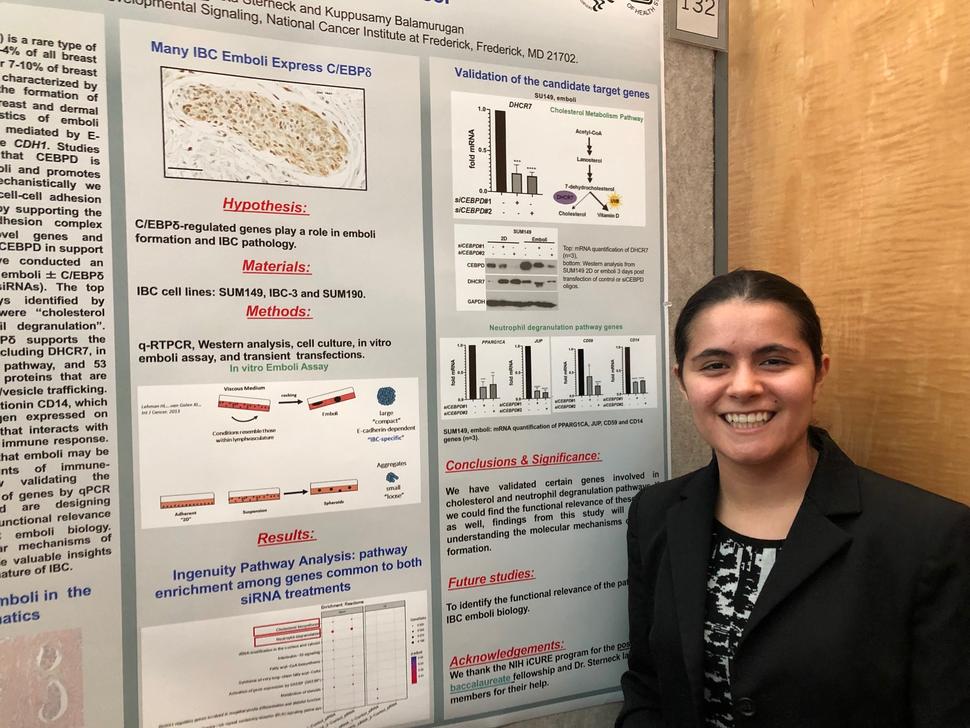Intramural Continuing Umbrella of Research Experiences (iCURE)
The Intramural Continuing Umbrella of Research Experiences (iCURE) program supports mentored research experiences for qualified students and scientists from diverse backgrounds in the multidisciplinary research environment of the NCI campuses in Bethesda, Rockville, and Frederick, Maryland.
iCURE is an extension of the highly successful NCI CCHE Continuing Umbrella of Research Experiences (CURE) program which helps support the career progress of its scholars toward research independence, as well as fosters and sustains diversity in the biomedical research pipeline.
NCI values diversity and particularly encourages applications from individuals from diverse backgrounds, including those from groups underrepresented in the cancer research workforce, for example those from the groups noted in the Notice of NIH’s Interest in Diversity (NOT-OD-20-031).
Is iCURE for Me?
Review the following statements to see whether iCURE is for you (see full eligibility criteria below):
- I am a citizen or non-citizen national, or legal permanent resident of the United States.
- By program start date, I will be eligible as a:
- Postbaccalaureate;
- Graduate Student (who is currently enrolled, in good standing, and has reached candidacy in a PhD program); or,
- Postdoctoral fellow (with no more than five years of relevant research experience since receipt of their most recent doctoral degree (PhD, MD, DDS, or the equivalent))
- If accepted, I am committed to conducting cancer research at one of the NCI campuses in Maryland (Bethesda, Rockville, Frederick) for the duration of the iCURE program.
- NCI is particularly interested in encouraging applications from individuals who are from diverse backgrounds, including those who are from groups underrepresented in the cancer research workforce, for example those from the groups noted in the Notice of NIH’s Interest in Diversity (NOT-OD-20-031).
The iCURE Program Experience
Participants in the iCURE program, or iCURE scholars, will enjoy research opportunities in the Center for Cancer Research (CCR), the Center for Global Health (CGH), the Division of Cancer Epidemiology and Genetics (DCEG), and the Division of Cancer Control and Population Sciences (DCCPS). iCURE provides opportunity for the following candidates:
- Post-baccalaureate (including post-master’s) individuals
- Graduate students
- Postdoctoral fellows
The iCURE program will provide the following:
- Two-year research experience awards for post-baccalaureate (including post-master’s)
- Two-year research experience awards for graduate students
- Three-year research experience awards for postdoctoral fellows
- iCURE research experience awards are paid. iCURE scholars receive a monthly stipend that is determined by their education level, GPA, and relevant experience. For details on stipends and other benefits, refer to the Cancer Research Training Awards Manual.
View the iCURE Ceremony Poster Flipbook.

Ensuring that the cancer research community reflects the communities we serve and includes a wide variety of experiences, perspectives, and talents is a critical aspect of making progress and ending cancer as we know it. iCURE is a model program for doing just that.
Each iCURE scholar will also enjoy professional and career support such as:
- Opportunities to work closely with world-class biomedical research scientists at the NCI
- Support by NCI program staff as well as information and resources on intramural and extramural funding opportunities
- Professional and career development activities
- Connection to an extensive and sustaining mentoring network
This ecosystem of support will help prepare iCURE scholars for the next steps in their academic and research careers.
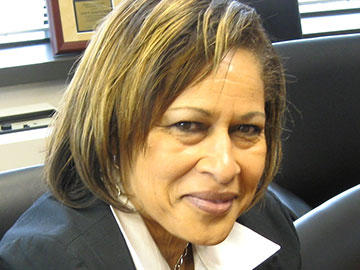
We are excited to expand the highly successful extramural CURE program into the intramural community. iCURE scholars will gain a valuable research experience and an understanding of how to navigate an NIH intramural research career path — and in the process, they will help enrich the intramural environment.
Research Experience
The NCI Intramural Research Program (IRP) maintains a strong focus on rare cancers and cancers in underserved populations worldwide, as well as emerging scientific opportunities in cancer research. The NCI IRP offers an unparalleled cancer research environment to train the next generation of researchers, with opportunities across the basic to clinical spectrum of cancer research.
- Center for Cancer Research (CCR)
CCR conducts basic and clinical cancer research and develops breakthrough discoveries into novel therapeutic interventions for adults and children afflicted with cancer or HIV. CCR scientists work on a wide spectrum of biological and biomedical problems ranging from visualizing and understanding the structure of individual genes and proteins, developing novel methods for drug discovery, to inventing biomedical devices and technology and creating innovative ways to treat patients in the NIH Clinical Center.
CCR provides a highly interactive, multidisciplinary culture for basic and clinical researchers to conduct high-risk, high-impact research. Learn more about CCR’s research.
- Center for Global Health (CGH)
CGH supports NCI's mission to improve cancer control worldwide. CGH funds research to reduce the global burden of cancer and offers research training opportunities for investigators to strengthen their research abilities. CGH offers research training experiences in diverse areas of global research including implementation science, clinical research and clinical trials, global cancer disparities research, and research workforce capacity building. Learn more about CGH’s research.
- Division of Cancer Control and Population Sciences (DCCPS)
DCCPS aims to reduce cancer risk, incidence, and death and enhance quality of life for cancer survivors. Cancer control science is the conduct of basic and applied research in the behavioral, social, and population sciences to create or enhance interventions that, independently or in combination with biomedical approaches, reduce cancer risk, incidence, morbidity and mortality, and improve quality of life (Cancer Control Program Review Group, 1998—modified). DCCPS offers an excellent training experience in research areas including epidemiology and genomics; healthcare delivery; implementation science; survivorship; behavioral research; surveillance; and health disparities. Learn more about DCCPS’s research. - Division of Cancer Epidemiology and Genetics (DCEG)
DCEG is a global leader in cancer epidemiology and genetics research and is uniquely positioned to conduct projects that are high risk in nature.
DCEG’s multidisciplinary research covers most types of cancer and many exposures in a variety of populations. DCEG’s epidemiologists, geneticists, biostatisticians, and clinicians conduct population and multidisciplinary research to discover the genetic and environmental determinants of cancer and new approaches to cancer prevention. Learn more about DCEG’s research.
Interested in learning more about potential iCURE research experiences at the NCI? Check out the list of possible projects for research experiences that will begin in Fall 2025.

We are so excited to host iCURE students and fellows. This amazing program provides a unique opportunity for our investigators to mentor talented early career scientists and foster the next generation of biomedical researchers.

We have been fortunate to have an increasing number of iCURE scholars coming to DCEG. Diversity—of background, thought, and approach—improves the scientific community and the quality and impact of our research. Our trainees work collaboratively with DCEG’s investigators to uncover the causes of cancer in human populations.

Our division offers a unique and robust training experience for cancer research trainees with a focus on cancer control and an emphasis on health equity and health disparities. Our outstanding mentors are experienced in working with trainees from diverse backgrounds and offer a range of topics to explore. Do consider joining us.
Apply to be an iCURE Scholar
If you are interested in becoming an iCURE scholar:
- Read the eligibility requirements below;
- Contact iCURE@nih.gov to obtain an eRA Commons ID; and
- Submit an iCURE scholar application
The Fiscal Year 2025 application period opens on September 23, 2024 and closes on November 25, 2024. Applicants should expect to be informed of their status based on the timeline below. The target start date will be September 1, 2025.
iCURE Eligibility
iCURE scholars must be a citizen or non-citizen national of the United States or an individual who has been lawfully admitted for permanent residence in the United States.
Post-baccalaureate (including post-master’s) individuals must meet both the Postbaccalaureate IRTA Program and the iCURE program eligibility criteria.
Graduate students enrolled in Ph.D., M.D., D.D.S., D.M.D, D.V.M, or equivalent degree programs (which involves dissertation research). Students must have completed course requirements, passed qualifiers, and be formally recognized by the university as a doctoral degree candidate. The NCI research experience is undertaken to engage in a research project for the purpose of developing and writing a doctoral dissertation.
Postdoctoral fellows must have acquired a PhD, MD, or other equivalent degree by the proposed iCURE start time and should have completed no more than five years of relevant research experience since receipt of the most recent doctoral degree.
In order to be approved for logical and physical access to NIH facilities and systems, candidates must be able to pass a Federal background check, using Standard Form-85 (read SF-85). NOTE: Section 14 of the form asks, "In the last year, have you used, possessed, supplied, or manufactured illegal drugs?" The question pertains to the illegal use of drugs or controlled substances in accordance with Federal laws, even though permissible under state laws. The use, possession, supply, or manufacture of marijuana may preclude you from obtaining the necessary clearances to participate in NIH intramural training programs, even if you were initially offered a position. If you have questions about this policy or would like guidance on the clearance process, please reach out to oite@nih.gov (please put “Eligibility Inquiry” in the subject line).
Other Considerations
NCI values diversity and particularly encourages applications from individuals from diverse backgrounds, including those from groups underrepresented in the cancer research workforce, for example those from the groups noted in the Notice of NIH’s Interest in Diversity (NOT-OD-20-031) and also noted below:
- Individuals from racial and ethnic groups who have been shown by the National Science Foundation to be underrepresented in health-related sciences on a national basis (see data at http://www.nsf.gov/statistics/showpub.cfm?TopID=2&SubID=27 and the report Women, Minorities, and Persons with Disabilities in Science and Engineering). The following racial and ethnic groups have been shown to be underrepresented in biomedical research: Blacks or African Americans, Hispanics or Latinos, American Indians or Alaska Natives, Native Hawaiians and other Pacific Islanders. In addition, it is recognized that underrepresentation can vary from setting to setting; individuals from racial or ethnic groups that can be demonstrated convincingly to be underrepresented by the grantee institution should be encouraged to participate in NIH programs to enhance diversity. For more information on racial and ethnic categories and definitions, see the OMB Revisions to the Standards for Classification of Federal Data on Race and Ethnicity (https://www.govinfo.gov/content/pkg/FR-1997-10-30/html/97-28653.htm).
- Individuals with disabilities, who are defined as those with a physical or mental impairment that substantially limits one or more major life activities, as described in the Americans with Disabilities Act of 1990, as amended. See NSF data at https://www.nsf.gov/statistics/2017/nsf17310/static/data/tab7-5.pdf.
- Individuals from disadvantaged backgrounds, defined as those who meet two or more of the following criteria:
- Were or currently are homeless, as defined by the McKinney-Vento Homeless Assistance Act (Definition: https://nche.ed.gov/mckinney-vento/)
- Were or currently are in the foster care system, as defined by the Administration for Children and Families (Definition: https://www.acf.hhs.gov/cb/focus-areas/foster-care)
- Were eligible for the Federal Free and Reduced Lunch Program for two or more years (Definition: https://www.fns.usda.gov/school-meals/income-eligibility-guidelines)
- Have/had no parents or legal guardians who completed a bachelor’s degree (see https://nces.ed.gov/pubs2018/2018009.pdf)
- Were or currently are eligible for Federal Pell grants (Definition: https://www2.ed.gov/programs/fpg/eligibility.html)
- Received support from the Special Supplemental Nutrition Program for Women, Infants and Children (WIC) as a parent or child (Definition: https://www.fns.usda.gov/wic/wic-eligibility-requirements)
- Grew up in one of the following areas: a) a U.S. rural area, as designated by the Health Resources and Services Administration (HRSA) Rural Health Grants Eligibility Analyzer (https://data.hrsa.gov/tools/rural-health), or b) a Centers for Medicare and Medicaid Services-designated Low-Income and Health Professional Shortage Areas (qualifying zip codes are included in the file). Only one of the two possibilities in #7 need be used as a criterion for the disadvantaged background definition.
Students from low socioeconomic (SES) status backgrounds have been shown to obtain bachelor’s and advanced degrees at significantly lower rates than students from middle and high SES groups (see https://nces.ed.gov/programs/coe/indicator_tva.asp), and are subsequently less likely to be represented in biomedical research. For background see Department of Education data at https://nces.ed.gov/; https://nces.ed.gov/programs/coe/indicator_tva.asp; https://www2.ed.gov/rschstat/research/pubs/advancing-diversity-inclusion.pdf.
- Literature shows that women from the above backgrounds (categories A, B, and C) face particular challenges at the graduate level and beyond in scientific fields. (See, e.g., From the NIH: A Systems Approach to Increasing the Diversity of Biomedical Research Workforce https://www.ncbi.nlm.nih.gov/pmc/articles/PMC5008902/ ).
Women have been shown to be underrepresented in doctorate-granting research institutions at senior faculty levels in most biomedical-relevant disciplines, and may also be underrepresented at other faculty levels in some scientific disciplines (See data from the National Science Foundation National Center for Science and Engineering Statistics: Women, Minorities, and Persons with Disabilities in Science and Engineering, special report available at https://www.nsf.gov/statistics/2017/nsf17310/, especially Table 9-23, describing science, engineering, and health doctorate holders employed in universities and 4-year colleges, by broad occupation, sex, years since doctorate, and faculty rank).
Upon review of NSF data, and scientific discipline or field related data, NIH encourages institutions to consider women for faculty-level, diversity-targeted programs to address faculty recruitment, appointment, retention or advancement.
NCI encourages applications from scholars who participate in the CCHE CURE, CCHE Partnerships to Advance Cancer Health Equity (PACHE), NIH National Research Mentoring Network, and/or the NIH Building Infrastructure Leading to Diversity (BUILD) Initiative.
Contact
If you have questions about the program or application process, please contact iCURE@nih.gov.
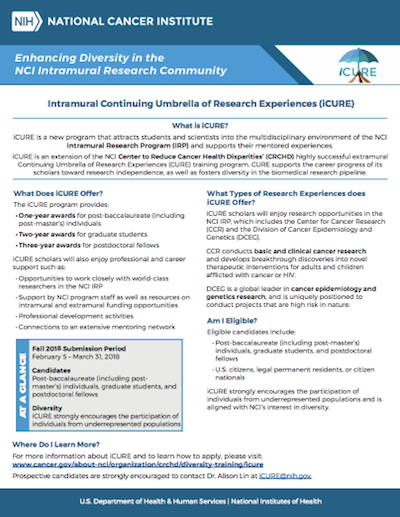
iCURE Fact Sheet - Updated!
Download the iCURE fact sheet for an overview about the iCURE program, research experiences, and candidate eligibility.
